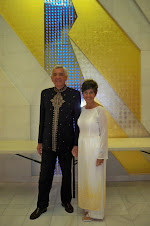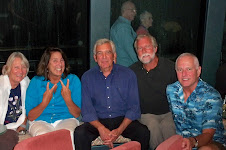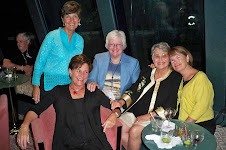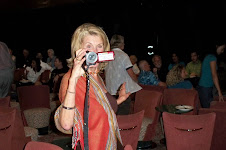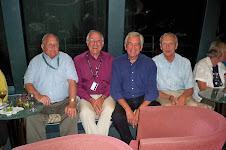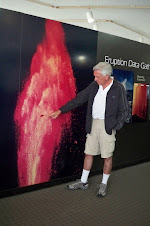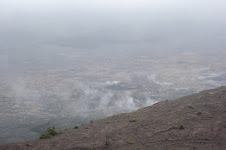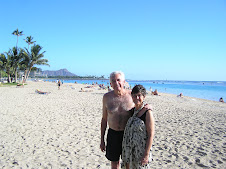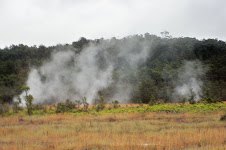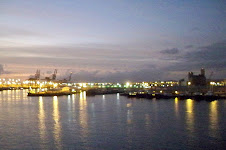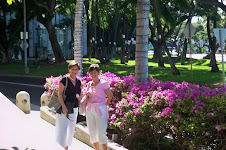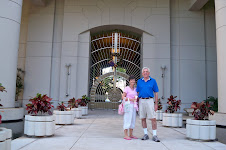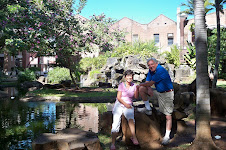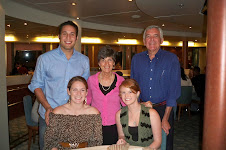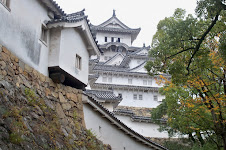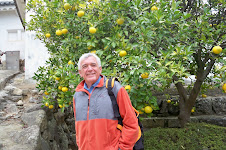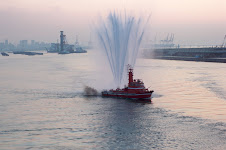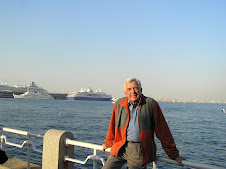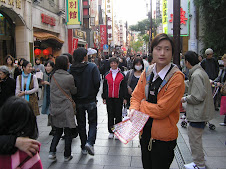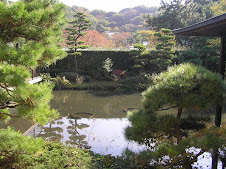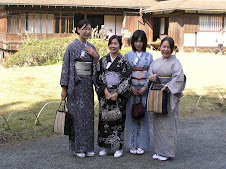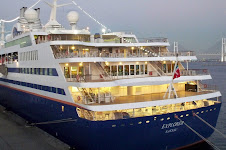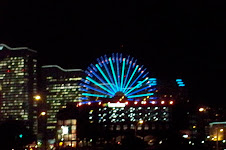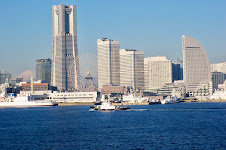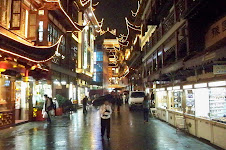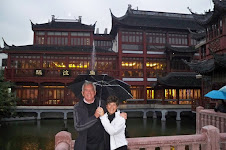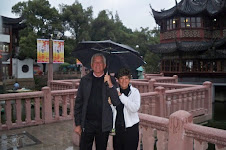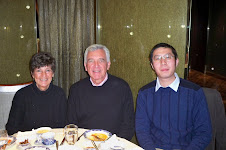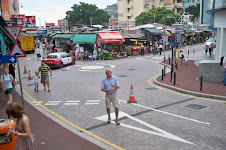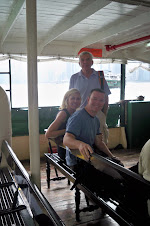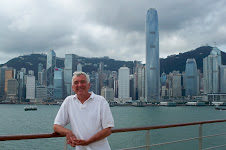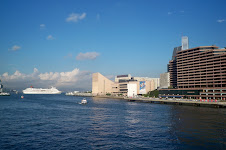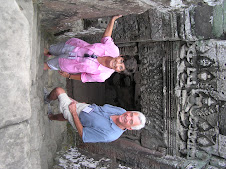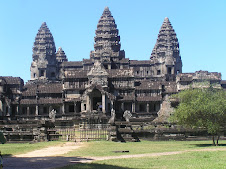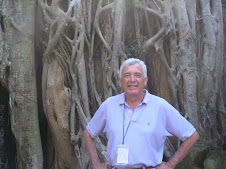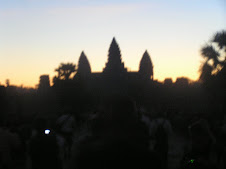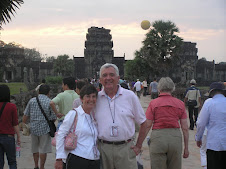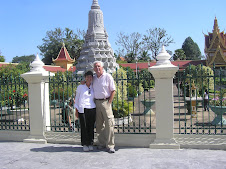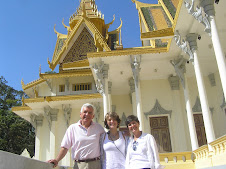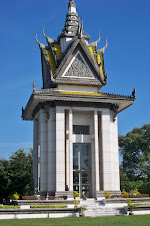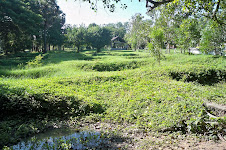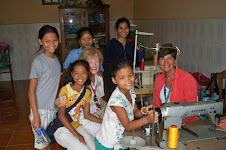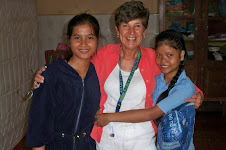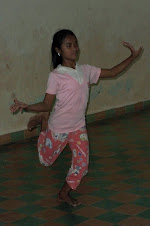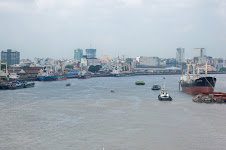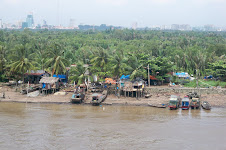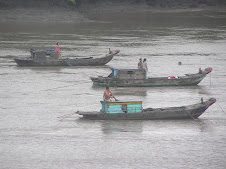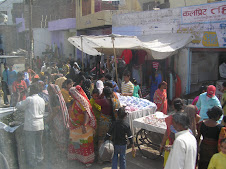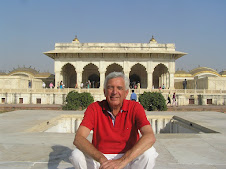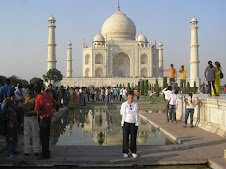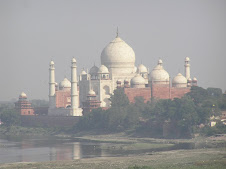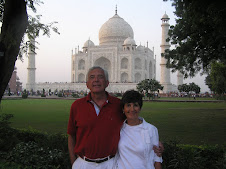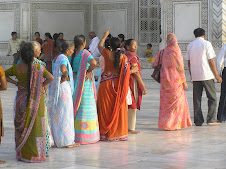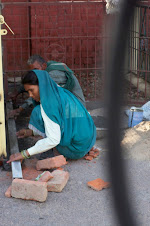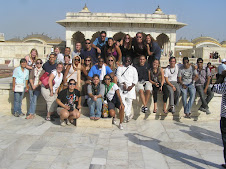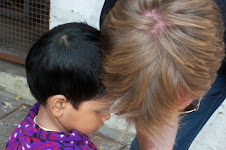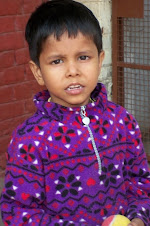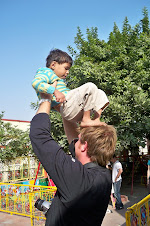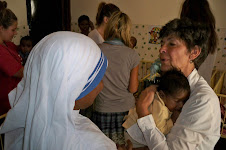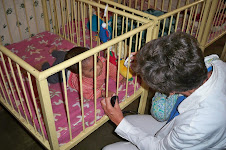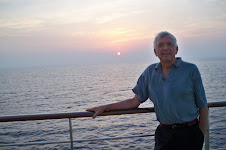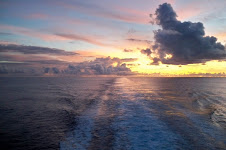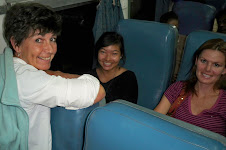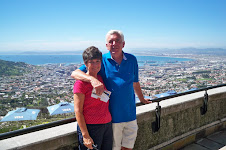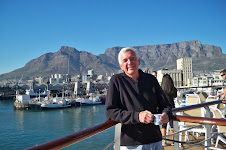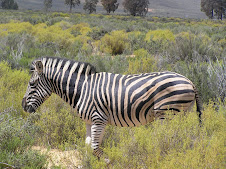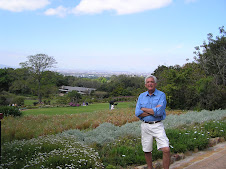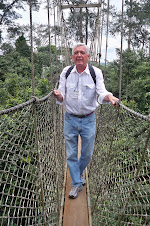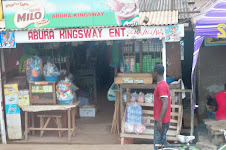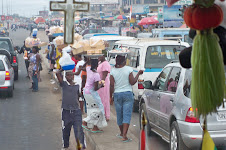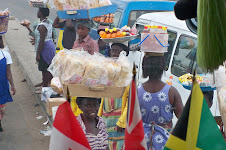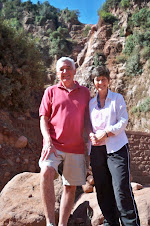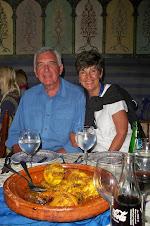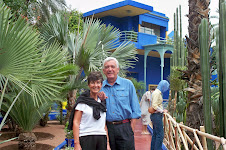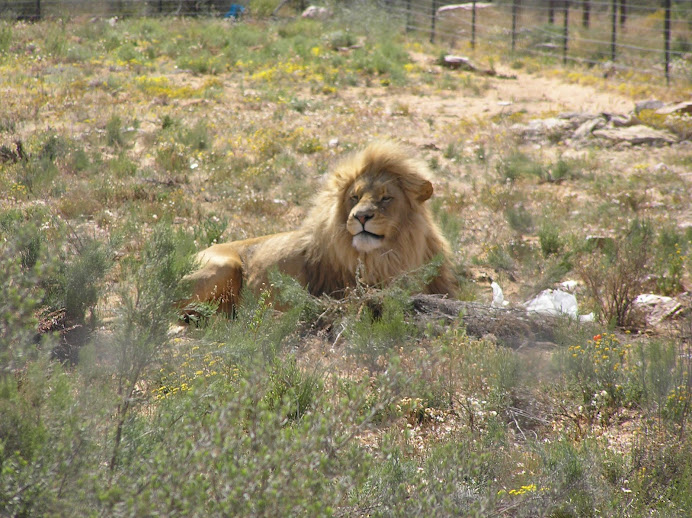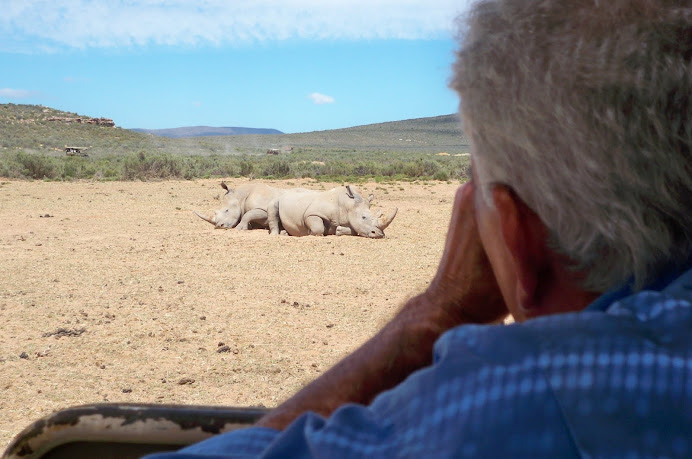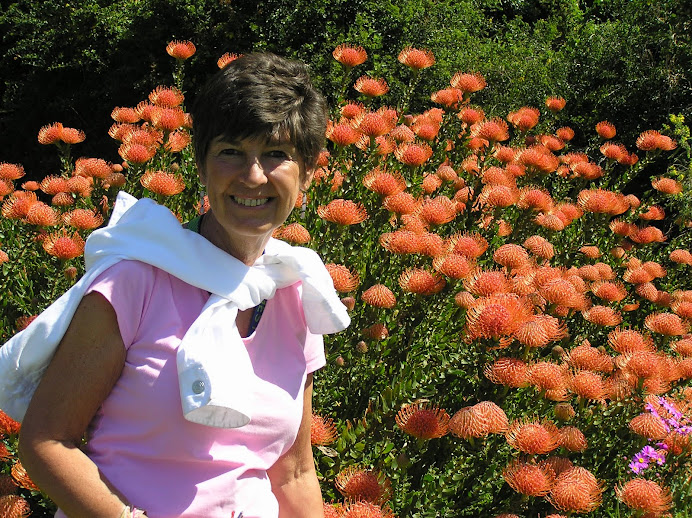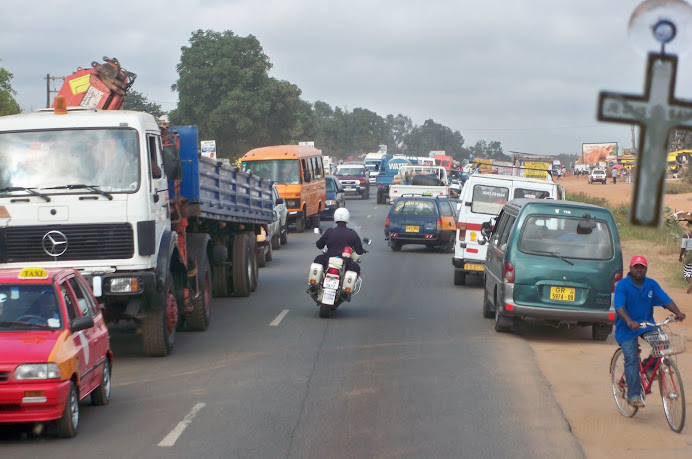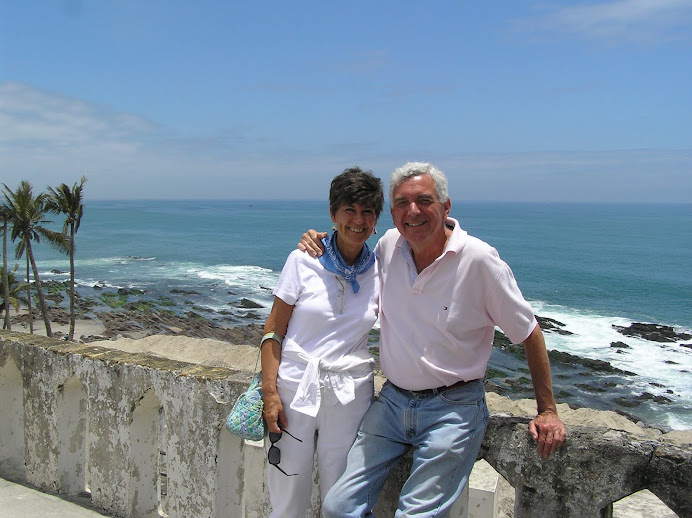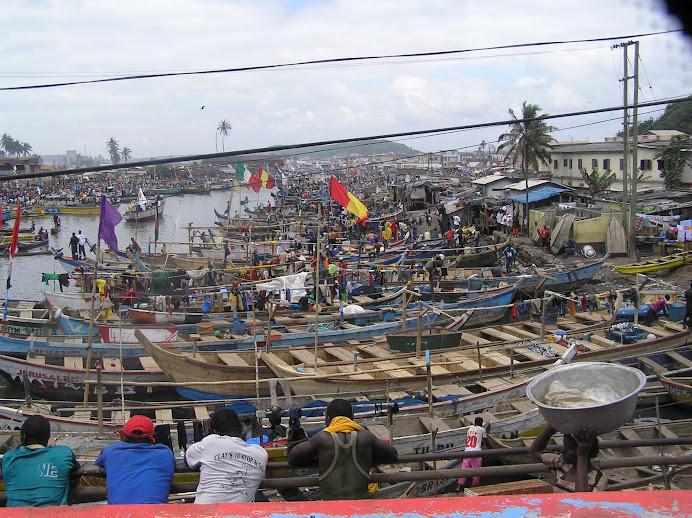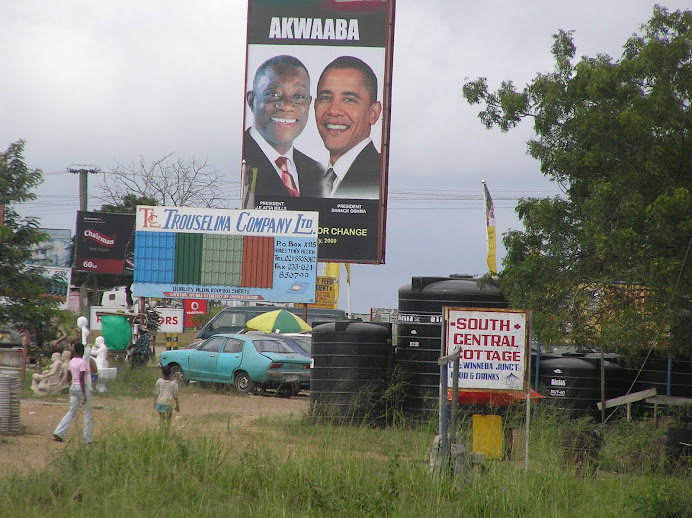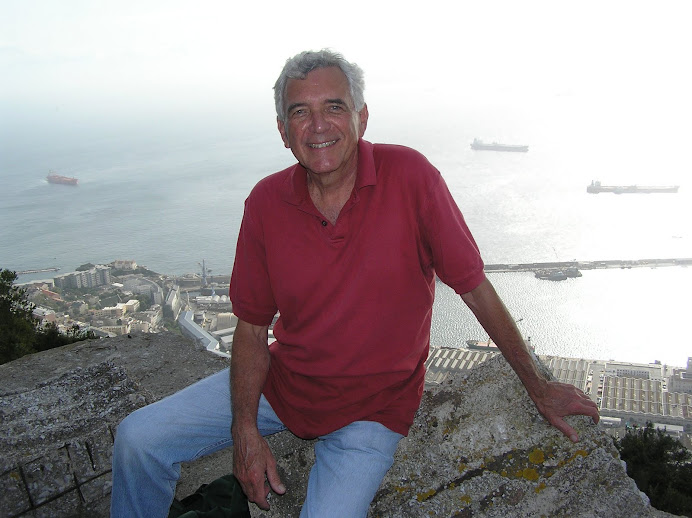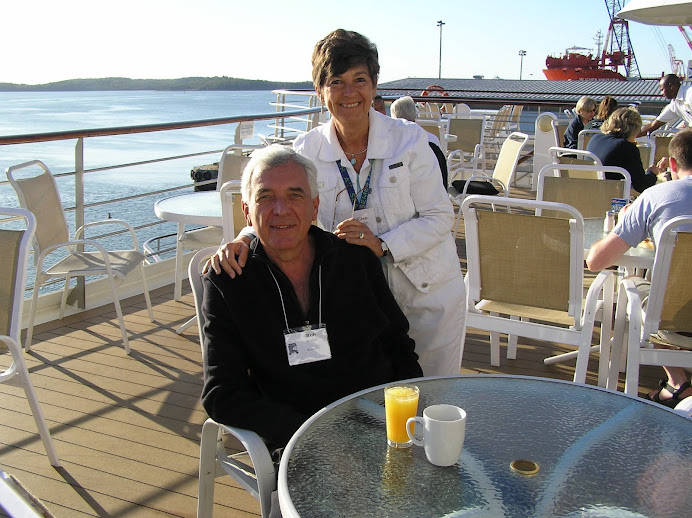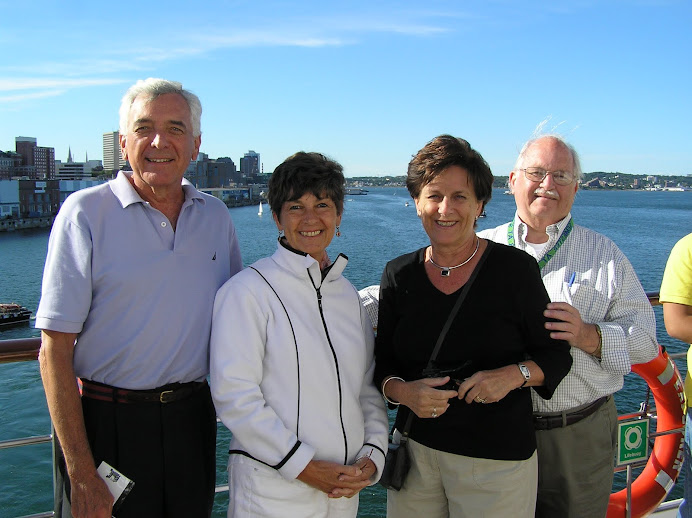- From Ellen
- Rob and I are going around the world on the 100th voyage of Semester at Sea. We board our ship, the MV Explorer, a floating college campus, in Norfolk, VA on August 24 with the rest of the 30 faculty members and their families. We arrive in our first port, Hallifax, Novia Scotia, on August 27 where 650 college students from 250 colleges and universities come on board to begin their Semester at Sea, for which they earn credit toward their bachelors degrees. When you are on the Interactive map, you can click on each port to see when we are there and see information about each port.
Thursday, October 22, 2009
at sea in the Indian Ocean
While in Ghana, Milton visited a local school. He was horrified at what he saw in the school, broken windows, adilapidated building, no working bathrooms, no school supplies(pencils, paper, and such), very few desks...So Milton arranged tohave the school remodeled and up-dated to be a reasonable place to learn. He bought school supplies and mailed them back to the Ghanaian school from South Africa. Milton decided he was going to support moreschools in this way. He talked to Rob who is teaching a Non-profit Leadership class. Rob had Milton come and speak to his class about his school ideas. The next class, when Milton was not present, Rob asked the students if they would be interested inhelping Milton set up a non-profit organization to help the schools inGhana, one at a time, as Milton wanted. The entire class was thrilledwith the idea. In addition to doing their regular class work for Rob, they are going to, with Rob's guidance, set up Milton's organization according to Milton's plans and with Milton participating all the way. Rob knows exactly was they need to do to set up the organization tosucceed. I am very happy for all of them, including the schoolchildren. We are in the Indian Ocean in a place at the Equator referred toby sailors as the doldrums--where there is no wind. Sailors would haveto go into small boats and row to pull their sailing ships out of thedoldrums so they could continue on their way. Fortunately for us, wehave a motor and can keep right on moving straight throw the doldrums. Mauritius was an easy and relaxing port for all of us. Port Louis,the capitol, is where we docked. We took water taxis for $2 each wayto get to the wharf. From there we could go into all sorts of shops and then under a short tunnel and into the central market and beyond that to the public buses. The last day in Mauritius we took a public bus to one of the many famous and beautiful beaches for a swim in the Indian Ocean. We went to a large lagoon which had a choral reef separating us from the large ocean breakers and blocked us off from sharks. I loved swimming in the beautiful water. I went in intending to just get my feet wet. I had on a swim suit, so kept walking out into the water until I decided to swim. I rushed forward and was happily swimming away when I suddenly remembered that I had stuffed my wallet and my ship ID down the front of my swim suit. Luckily, nothing was ruined, just wet.I paid my water taxi fare back to the ship with two very wet dollar bills. The afternoon at the stunning beach was almost magical. Walking along the shore we passed two different baptism ceremonies going on in the Indian Ocean. The baptism included a very graceful dunking in the Indian Ocean. Those being baptised were all local black Mauritians whose ancestors were brought as slaves to plant and tend the sugarcane fields. The Island was uninhabited when settled by the Dutch 3 or 4 hundredyears ago. Many Indians were brought in to help with the labor in the fields. Mauritius is considered a "developing nation".They still grow sugar cane and have other industry. The largest industry is the tourist industry and they do a nice job with it. We took the public bus to the beach and back for two reasons, 1, the bus ride costs 85 cents and the taxi would be $35 each and 2 so we could see the countryside as we went. The only reason we could see for taking a taxi is that it would be quicker--20 minutes verses and hour on the bus. We figured we had an hour to look at the countryside andsee the locals. Again, while walking on the beach we came across three of our faculty friends from the ship, sitting on three padded and elegant beach chairs they had rented for the day along with a beach umbrella.They invited us to join them, which we did for several hours. They had befriended a handsome local young man who sold fresh, ripe, sweet, and juicy pineapples. We each got one and they were wonderful. The pineapple young man peeled the pineapple in such a way that we couldeat it, holding on to the stem, as if it were a large lollipop. Then we learned that our pineapple man had a twin brother at a lunch standwhere he sold wonderful barbecued sandwiches. When we got ready to leave, I wanted to change into dry clothes. One of our faculty friends walked me over (5 steps) to the man who had rented them the chairs and umbrella and asked him if I could chance clothes in theback of his van. He was very gracious and even closed both of the backdoors of his van for me. I thanked him afterward and gave him the equivalent of bus fare a a thank you. He assured me that money was not necessary, but I gave it to him anyway, just leaving it on his table.You may think that sounds cheap, but actually for them it was awelcome amount.As we walked off to leave we decided we needed some sort of lunch, so Rob and I walked the pineapple man's brother's foodstand and got a sandwich from the identical twin. Then I wanted something to drink. Now the only local money we had was a huge bill which no one at the beach seemed to be able to break. So we went back to our food stand twin and asked if he would sell us a soft drink forAmerican money. So he sold us a drink for a dollar and then told us that he needed to give us the exact change for the bus, so he sold us bus fare for another $2 and he gave us more than enough change because the bus fare was less than $1 each. Then he walked us over to the bus,and told us how to get the right one. All of us on the ship have had wonderful experiences with local people in almost every port (not Morocco). Rob and I have quit trying to bargain down the price of anything. The prices are already low, and the people need the money.We want them to have the money we spend. The sandwich we bought from the food stand twin was delicious. It was lots of barbecued chicken on a whole baguette. The bread was also delicious. The ride to and from the beach showed us mountains in the center of the island and beautiful beaches and coastline all around.t. The small towns we passed showed us very little wealth, but not the dire poverty we had seen in Ghana and South Africa. Mauritius reminded me of Puerto Rico, only not quite as poor.
Monday, October 12, 2009
at sea in the Indian Ocean
We are about 10 miles from Madagascar and almost a thousand miles from our next port, the small island of Mauritius.
Back to thoughts of Cape Town and South Africa--
Our trip to the Townships (the place where the black population was forced to live during Apartheid and where they live still, mainly for economic reasons) was sobering. I knew I would see mass poverty, but I could not imagine 2 million people living in one of 10 Townships mostly in makeshift shanties (with buckets for toilets) placed side by side by side for mile after mile after mile.The South African government is trying to replace the small (the size of our breakfast room at home) shacks, which have no running water, sewer, or electricity, with small houses made of cinder block, painted bright colors, with corrugated metal roofs, and running water and electricity, if the owner can pay the monthly utility fee. These new neighborhoods have streets and schools, but the schools are not anywhere near as good as the worst school in the entire United States--the Township schools do not have pencils, chalk, computers or more than a very few books. We walked, escorted by people of the neighborhood, called guides, paid to escort us and keep us safe, through one of the newest and best of the still slum neighborhoods in the newest and largest Township. Laughing, happy children danced along with us--holding our hands, delighted to see us. We were told by our tour guide, who grew up in and still chooses to live in a Township, not to give the children money--he said if we do we turn them into beggars. If we give them money, next time they will ask for it, soon they would stay out of school to beg.
Trash was in the streets. I had no trouble telling by the smell who was able to pay for running water and who was not. Unemployment in all of South Africa is 38%, in the Townships the number is double. Imagine almost 80% of 2 million people living with no income. Some people had small stores for basic food, a few ran beauty parlors and barbershops. These business were exactly like the tiny makeshift shops in Ghana. Residents had to walk miles to get to public transportation in order to get to Cape Town. Then, if you have the fare, the bus takes an hour or more to get to Cape Town where the most fortunate have jobs.
We were taken to a couple of government-run shops where people sold things they had made. Our tour guide asked us not to bargain down to the lowest price we could get, please just bargain down to the lowest price we are willing to pay. The people need to earn a living. We all found things to buy and we paid the asking price--$3 each for Christmas ornaments, $2 each for earrings...
Some black people have been able to rise out of poverty and even into wealth now that Apartheid has been abolished. Many of these wealthy black people, who can afford nice houses and nice cars, tend to chose to live in nice houses in the Townships because they want to support the people who still live there and because their friends are here and their culture is here. Racism is still rampant in South Africa even though the laws are now fair. Black people are legally allowed to live in Cape Town, but they are not welcome there. Black neighborhoods are still kept out of sight of beautiful Cape Town itself.
We learned from talking with people in the Townships that most of the children living in the Township have never seen the coast. The Townships are on a peninsula surrounded by the ocean. We passed beautiful coastlines on the bus on the way to the Townships. Individuals live their whole lives without ever leaving the Township in which they were born. Aids and alcoholism are rampant and keep the black population in poverty and despair.
In Cape Town the houses are lovely, the neighborhoods are all very well kept. The best neighborhoods are surrounded by high walls. All of the houses and apartment buildings are surrounded by high walls, with heavy, metal, locked gates. The windows have heavy metal bars. Security is heavier than any I have ever seen before. Violent crime is among the highest in the world. The murder rate is the third highest of any major city. A woman is raped every 40 seconds in South Africa. Amidst breathtakingly beautiful surroundings, the white population are living as prisoners in their own homes. During Apartheid, 13% of the population was white. Now the number is 9% and still dropping. If we had stayed inside of Cape Town, and not looked too closely, we would have seen an ideal place to live. We were treated well everywhere we went. The bus ride (we always have brand-new, comfortable tour buses) of2 1/2 hours to the Aquila Game Preserve took us into a huge, lush valley covered with the green vineyards where grapes are grown for the South African wines which are appreciated world-wide. On each end of the valley were mountains a bit like the Rockies, but not a stark and not as high. Upon arrival at the game preserve, we were fed a delicious breakfast, and then sent out in long jeeps, all of us armed with cameras, for 2 1/2 hours on jeep trails where our guide stopped each time he spotted wild animals, so we could take pictures while he told us all about the animal we were seeing. He was a blue-eyed blond who spoke English with an Afrikaners accent and who had spent his whole life in South Africa. We all liked him and were impressed by all he taught us.
One rainy afternoon we ducked into the 6 star hotel right on the wharf directly in front of our ship. We noticed that tea was being served in a beautiful dinning room with huge tall windows, three stories high, looking out on the bay. We decided to have high tea and thus spent a lovely afternoon, out of the rain, looking at a beautiful view, chatting with each other while being served more delicious treats than we could possibly eat, along with the best big pot of tea I have ever had. For our further entertainment, a few small song birds had gotten in and were occasionally flying across the room high above our heads, as if they had been hired by the hotel to look charming while we dined.
South Africa was fascinating, stunning, shocking. I am glad we came, glad we saw.
Back to thoughts of Cape Town and South Africa--
Our trip to the Townships (the place where the black population was forced to live during Apartheid and where they live still, mainly for economic reasons) was sobering. I knew I would see mass poverty, but I could not imagine 2 million people living in one of 10 Townships mostly in makeshift shanties (with buckets for toilets) placed side by side by side for mile after mile after mile.The South African government is trying to replace the small (the size of our breakfast room at home) shacks, which have no running water, sewer, or electricity, with small houses made of cinder block, painted bright colors, with corrugated metal roofs, and running water and electricity, if the owner can pay the monthly utility fee. These new neighborhoods have streets and schools, but the schools are not anywhere near as good as the worst school in the entire United States--the Township schools do not have pencils, chalk, computers or more than a very few books. We walked, escorted by people of the neighborhood, called guides, paid to escort us and keep us safe, through one of the newest and best of the still slum neighborhoods in the newest and largest Township. Laughing, happy children danced along with us--holding our hands, delighted to see us. We were told by our tour guide, who grew up in and still chooses to live in a Township, not to give the children money--he said if we do we turn them into beggars. If we give them money, next time they will ask for it, soon they would stay out of school to beg.
Trash was in the streets. I had no trouble telling by the smell who was able to pay for running water and who was not. Unemployment in all of South Africa is 38%, in the Townships the number is double. Imagine almost 80% of 2 million people living with no income. Some people had small stores for basic food, a few ran beauty parlors and barbershops. These business were exactly like the tiny makeshift shops in Ghana. Residents had to walk miles to get to public transportation in order to get to Cape Town. Then, if you have the fare, the bus takes an hour or more to get to Cape Town where the most fortunate have jobs.
We were taken to a couple of government-run shops where people sold things they had made. Our tour guide asked us not to bargain down to the lowest price we could get, please just bargain down to the lowest price we are willing to pay. The people need to earn a living. We all found things to buy and we paid the asking price--$3 each for Christmas ornaments, $2 each for earrings...
Some black people have been able to rise out of poverty and even into wealth now that Apartheid has been abolished. Many of these wealthy black people, who can afford nice houses and nice cars, tend to chose to live in nice houses in the Townships because they want to support the people who still live there and because their friends are here and their culture is here. Racism is still rampant in South Africa even though the laws are now fair. Black people are legally allowed to live in Cape Town, but they are not welcome there. Black neighborhoods are still kept out of sight of beautiful Cape Town itself.
We learned from talking with people in the Townships that most of the children living in the Township have never seen the coast. The Townships are on a peninsula surrounded by the ocean. We passed beautiful coastlines on the bus on the way to the Townships. Individuals live their whole lives without ever leaving the Township in which they were born. Aids and alcoholism are rampant and keep the black population in poverty and despair.
In Cape Town the houses are lovely, the neighborhoods are all very well kept. The best neighborhoods are surrounded by high walls. All of the houses and apartment buildings are surrounded by high walls, with heavy, metal, locked gates. The windows have heavy metal bars. Security is heavier than any I have ever seen before. Violent crime is among the highest in the world. The murder rate is the third highest of any major city. A woman is raped every 40 seconds in South Africa. Amidst breathtakingly beautiful surroundings, the white population are living as prisoners in their own homes. During Apartheid, 13% of the population was white. Now the number is 9% and still dropping. If we had stayed inside of Cape Town, and not looked too closely, we would have seen an ideal place to live. We were treated well everywhere we went. The bus ride (we always have brand-new, comfortable tour buses) of2 1/2 hours to the Aquila Game Preserve took us into a huge, lush valley covered with the green vineyards where grapes are grown for the South African wines which are appreciated world-wide. On each end of the valley were mountains a bit like the Rockies, but not a stark and not as high. Upon arrival at the game preserve, we were fed a delicious breakfast, and then sent out in long jeeps, all of us armed with cameras, for 2 1/2 hours on jeep trails where our guide stopped each time he spotted wild animals, so we could take pictures while he told us all about the animal we were seeing. He was a blue-eyed blond who spoke English with an Afrikaners accent and who had spent his whole life in South Africa. We all liked him and were impressed by all he taught us.
One rainy afternoon we ducked into the 6 star hotel right on the wharf directly in front of our ship. We noticed that tea was being served in a beautiful dinning room with huge tall windows, three stories high, looking out on the bay. We decided to have high tea and thus spent a lovely afternoon, out of the rain, looking at a beautiful view, chatting with each other while being served more delicious treats than we could possibly eat, along with the best big pot of tea I have ever had. For our further entertainment, a few small song birds had gotten in and were occasionally flying across the room high above our heads, as if they had been hired by the hotel to look charming while we dined.
South Africa was fascinating, stunning, shocking. I am glad we came, glad we saw.
at sea after Cape Town
I have managed to get new pictures posted both along the side and at the bottom.
Cape Town was a rich experience, both good and disturbing. The first day we took a cable car up to the top of Table Mountain which rises straight up from the heart of Cape Town. Our ship anchored in Table Bay in the center of the luxurious wharf area, with nice restaurants, shops, two luxury hotels and a very modern mall with elegant stores carrying luxury brands. We could see the ship, looking like a small toy, from the top of Table Mountain. The views from Table Mountain were breathtakingly beautiful from all four sides and from every angle. You can imagine Rob's disappointment when, after three pictures, the camera battery died and he didn't have a back-up camera. So we took in all of the stunning views with just our own eyes--and stored the memory in our own heads to last the rest of our lives. We will never forget Table Mountain.
The next day we went to the Sunday market (open only on Sunday) a bought some African-made presents we like for us and for others. Next stop was the world class botanical garden. This time we had two cameras and neither gave out. The pictures are spectacular. The huge gardens with miles of paths and lawns and African plants and flowers is a World Heritage Site, and for good reason.
Cape Town was a rich experience, both good and disturbing. The first day we took a cable car up to the top of Table Mountain which rises straight up from the heart of Cape Town. Our ship anchored in Table Bay in the center of the luxurious wharf area, with nice restaurants, shops, two luxury hotels and a very modern mall with elegant stores carrying luxury brands. We could see the ship, looking like a small toy, from the top of Table Mountain. The views from Table Mountain were breathtakingly beautiful from all four sides and from every angle. You can imagine Rob's disappointment when, after three pictures, the camera battery died and he didn't have a back-up camera. So we took in all of the stunning views with just our own eyes--and stored the memory in our own heads to last the rest of our lives. We will never forget Table Mountain.
The next day we went to the Sunday market (open only on Sunday) a bought some African-made presents we like for us and for others. Next stop was the world class botanical garden. This time we had two cameras and neither gave out. The pictures are spectacular. The huge gardens with miles of paths and lawns and African plants and flowers is a World Heritage Site, and for good reason.
Friday, October 2, 2009
More about Ghana
The Ghanians want to develop an active tourist trade--but they aren'tready for it yet. Roads are totally inadiquate. Well over 75 people from our ship (that's just the ones who went to the clinic and got tested) develped E Coli from food in Ghana, even though none of us drank the local water or ate food not cooked. We all came with medicine, so all are fine now--but people were horribly sick for days. I sent a post card from the only place I saw that had them--the castle of Elmina, overlooking the sea.
Morocco, on the other hand, had a well developed tourinst industry that provided phoney tourist experiences which were what the Moroccan's seemed to think the Americans and Europeans expected.
Slaves in Ghana were kept in dungeons at Elmina Castle and the Cape Coast Castle(where we had tours), among others, to be shipped to the Caribbean and then to South and North America. The slave trade was so horrendous that I will not even describe what we saw. I included a picture of the two of us at the beautiful castle overlooking the sea, where local fishermen go out every day by the hundreds, fishing for one of their main food staples. The people earn their living by fishing and/or farming. Fiftypercent of their food is still imported, so the small farmers (there are no large farms) do not grow enough to feed even just the people of Ghana.
Rob went on a trip I missed (I just need to take a day off to restup) to a national park in the rain forest. I sent a photo of Rob walking across the swinging bridge in the canopy of the rain forest.He loved it.
His trip began with a traffic adventure. The roads ofGhana are clogged with traffic at all times. The guide for this particular trip had a friend on the police force who lead their big tour bus with his motorcycle. Cars pulled off the road to the left and right. It was very exciting. The bus went fast right through the path cut by the policeman on his motorcycle--sometimes pulling over, with the bus right behind, onto the opposite side of the road into oncoming traffic, which pulled off the road quickly to get out of the way. Look at the picture of the motorcycle (below) taken through the front window of the bus and imagine a big bus speeding right behind.
Ghana is full of vehicles. Over 95% of transportation moves by cars on the highways which are totally overwhelmed by the traffic. Having the policeman at the beginning of the trip was great--but they were still 5 hours late getting back to the ship because the bus broke down and the trafficwas horrible. Trip after trip got back to the bus late. Some people had 12 and 18 hour bus trips because of traffic and delays at boarders. It took Rob's group 7 hours to get back from what was supposedto be a 3 hour return trip.
I sent Liza a picture of her Dad kissing a fish as we crossed the
Equator--part of a day of silly ceremonies. Apparently it struck
Schuyler as hilariously funny and he rolled over laughing. That humor
is clearly a guy thing. I am glad he enjoyed it.
I still love shipboard life. Tomorrow we land at Cape Town to spend
6 days there. I am looking forward to it very much in spite of a
pre-port meeting last night telling us how dangerous South Africa can
be for us. We can drink the water and walk freely around the
commercial area near the port. But the violent crime rate is high,
credit card theft is high, and aids is more prevalent than anywhere
else in the world. We are not to go into the Township around Cape Town
(the slums around Cape Town) unless we are part of an official tour
group with a local guide, no taxis to Townships because it is too
dangerous to us. I want to go--but will heed the warning and go only
on a group tour with Rob. I am not a risk taker.
Morocco, on the other hand, had a well developed tourinst industry that provided phoney tourist experiences which were what the Moroccan's seemed to think the Americans and Europeans expected.
Slaves in Ghana were kept in dungeons at Elmina Castle and the Cape Coast Castle(where we had tours), among others, to be shipped to the Caribbean and then to South and North America. The slave trade was so horrendous that I will not even describe what we saw. I included a picture of the two of us at the beautiful castle overlooking the sea, where local fishermen go out every day by the hundreds, fishing for one of their main food staples. The people earn their living by fishing and/or farming. Fiftypercent of their food is still imported, so the small farmers (there are no large farms) do not grow enough to feed even just the people of Ghana.
Rob went on a trip I missed (I just need to take a day off to restup) to a national park in the rain forest. I sent a photo of Rob walking across the swinging bridge in the canopy of the rain forest.He loved it.
His trip began with a traffic adventure. The roads ofGhana are clogged with traffic at all times. The guide for this particular trip had a friend on the police force who lead their big tour bus with his motorcycle. Cars pulled off the road to the left and right. It was very exciting. The bus went fast right through the path cut by the policeman on his motorcycle--sometimes pulling over, with the bus right behind, onto the opposite side of the road into oncoming traffic, which pulled off the road quickly to get out of the way. Look at the picture of the motorcycle (below) taken through the front window of the bus and imagine a big bus speeding right behind.
Ghana is full of vehicles. Over 95% of transportation moves by cars on the highways which are totally overwhelmed by the traffic. Having the policeman at the beginning of the trip was great--but they were still 5 hours late getting back to the ship because the bus broke down and the trafficwas horrible. Trip after trip got back to the bus late. Some people had 12 and 18 hour bus trips because of traffic and delays at boarders. It took Rob's group 7 hours to get back from what was supposedto be a 3 hour return trip.
I sent Liza a picture of her Dad kissing a fish as we crossed the
Equator--part of a day of silly ceremonies. Apparently it struck
Schuyler as hilariously funny and he rolled over laughing. That humor
is clearly a guy thing. I am glad he enjoyed it.
I still love shipboard life. Tomorrow we land at Cape Town to spend
6 days there. I am looking forward to it very much in spite of a
pre-port meeting last night telling us how dangerous South Africa can
be for us. We can drink the water and walk freely around the
commercial area near the port. But the violent crime rate is high,
credit card theft is high, and aids is more prevalent than anywhere
else in the world. We are not to go into the Township around Cape Town
(the slums around Cape Town) unless we are part of an official tour
group with a local guide, no taxis to Townships because it is too
dangerous to us. I want to go--but will heed the warning and go only
on a group tour with Rob. I am not a risk taker.
Subscribe to:
Comments (Atom)

